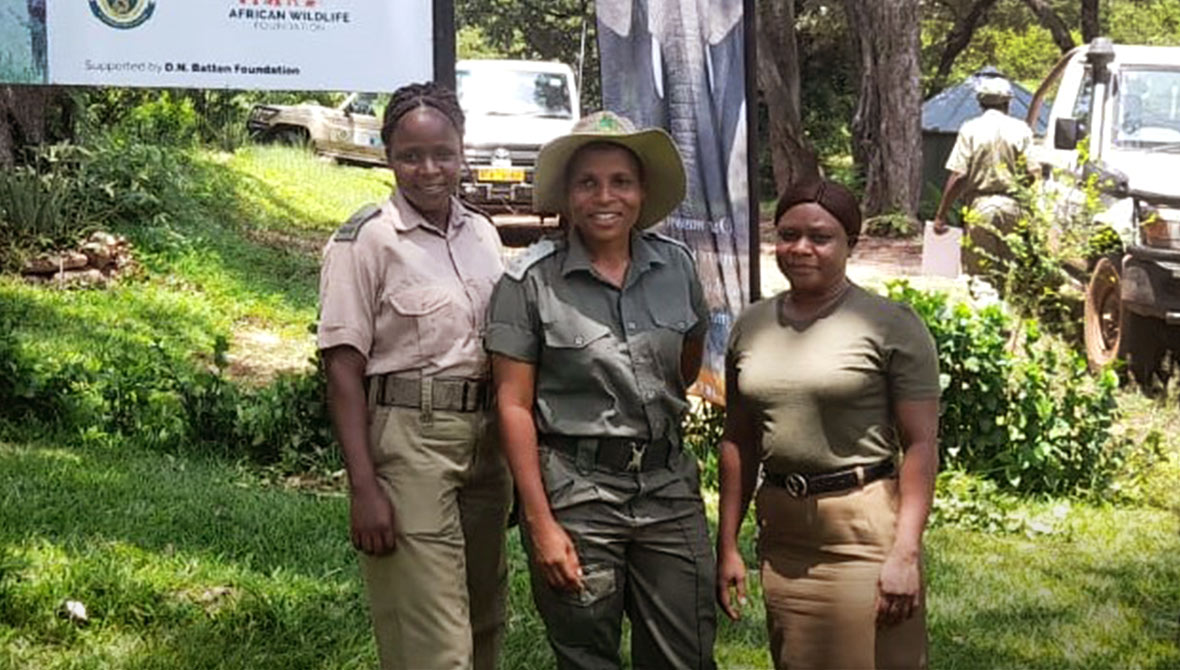IWD 2023: Digital anti-poaching tools elevate Zimbabwe’s women rangers

Samukele Zhou (left) and Florence Sakatira (right) are Zimparks rangers trained to use the Spatial Monitoring and Reporting Tool (SMART) in the Mid Zambezi Valley
In the final installment of African Wildlife Foundation’s two-part series on Zimbabwe’s women wildlife rangers embracing digital technology, Ndanatsiwa Tagwireyi speaks to Florence Sakatira and Samukele Zhou, rangers in northern Zimbabwe’s Mid Zambezi Valley.
Both working in the Charara Safari Area — one of the landscape’s protected areas, including Mana Pools National Park — the women share how the Spatial Monitoring and Reporting Tool (SMART) streamlines ecological monitoring and anti-poaching operations to protect endangered and threatened species in this biodiversity-rich landscape. Apart from housing an Important Bird Area and Ramsar site, the Mid Zambezi Valley is also a biosphere reserve. Mana Pools National Park is a notable archeological site in Zimbabwe following the discovery of the remains of Africa’s oldest dinosaur, Mbiresaurus raathi, in September 2022.
Sakatira and Zhou are among the wildlife defenders who have adopted SMART with support from AWF and partners, which has enhanced the Zimbabwe Parks & Wildlife Management Authority (Zimparks) wildlife management operations. AWF has provided ruggedized smartphones, laptops, and other equipment for field data capture and display, transforming how rangers record data in real time and generate targeted reports for adaptive protected area management. In tandem, AWF regularly facilitates training workshops for rangers to identify challenges, data or resource gaps while upgrading data administrators’ and managers’ use of the platform.
Zhou explains the capabilities of the technology: “SMART captures wildlife movements, mortalities, population, habitats, and demographic information. We can also mark and track our patrol routes, recording any illegal activity encountered during patrols and storing information of arrested people.” The system also allows rangers to collect information on tools used in illegal wildlife killings, such as wire snares and spears.
“SMART has improved how we carry our anti-poaching duties because we can easily locate the site of illegal activities,” Zhou said. As a digital tool, it contributes to the paperless world. She added, “SMART is much better than using forms and writing paper reports,” she remarked.
Sakatira reiterated the accuracy and efficiency of digital data collection using SMART. “If you capture your data correctly, no information will be missed or distorted.” This is particularly important for high-risk and resource-intensive anti-poaching operations. “Our deployments are now report-based as SMART gives a true reflection of on-the-ground information. It identifies hotspots, making it easier for management planning and resource allocations,” she added.
Women wildlife rangers tackle traditional gender roles
Despite working in a male-dominated environment, Zimparks’ women rangers and community wildlife scouts are taking advantage of SMART to improve the delivery of their anti-poaching duties and extend their contribution to species conservation.

Florence Sakatira is a Zimparks ranger in the Mid Zambezi Valley trained to use digital wildlife monitoring tools
Apart from helping her make decisions that improve the effectiveness of conservation management in the landscape, SMART has also impacted Sakatira personally. “The tool has made my work easier and more enjoyable,” she ponders, “With men dominating conservation work in the Zambezi valley, I usually felt inferior due to societal stereotypes. However, I have gained confidence and proven that women rangers are equally efficient in using SMART in anti-poaching and wildlife management.”
This is even though “balancing work-related issues and home administration” is a challenge, as noted by Zhou. She explains why encouraging more women to monitor wildlife species as rangers is significant: “If, for example, there are few animal sightings, we search for the cause and find the way to reduce the impacts. By doing so, women will always be conservation champions capable of maintaining wildlife resources for the current and future generations.”
“I am planning to teach my colleagues how to use this tool. Training in SMART has helped us embrace the changing world and move with time,” Sakatira weighed in. “As a woman who is delivering excellence with SMART, I want to inspire every woman to learn how to conserve our wildlife using SMART,” she added.
In honor of International Women’s Day, celebrated on March 8, Zhou concluded: Here is to every woman who helps other women to prosper!”
